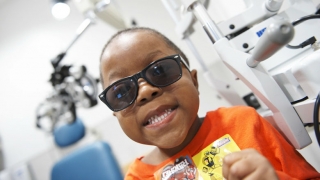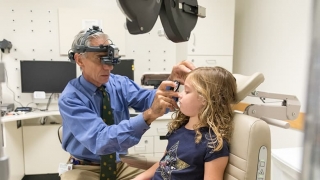Your Child's Ophthalmology Appointment
We’ve Moved!
If you previously had outpatient ophthalmology appointments at CHOP’s Specialty Care & Surgery Center in Voorhees, NJ, please remember that we’ve moved to the Specialty Care Center at Virtua. The new location is located in the Virtua Health & Wellness Center at 200 Bowman Drive. Call us at 215-590-2791 with any questions.
We are pleased to offer late afternoon and Saturday hours at many of our locations, including Buerger Center, Virtua, King of Prussia, Exton and Brandywine Valley. Ask your scheduler when making an appointment.
You will receive a reminder call in the week before your child's scheduled appointment. Please let us know if you have any changes to your contact information.
What to bring
Please make sure you bring the following to your child’s first appointment:
- Appointment information: doctor’s name, building name/location, time of appointment.
- Insurance information and current insurance cards: Please provide any authorization your insurance company may require. You should call your insurance company to get this information.
- Co-pay or co-insurance for the visit: If you have any questions, please call the pre-visit financial counseling hotline at 1-800-664-7855.
- Phone and fax numbers of your child’s primary care physician, pharmacy and the provider who referred you to CHOP.
- Medications: Bring all of the medications your child currently takes — including over-the-counter medications — in a bag. If you’d prefer to write a list of medications, we will need the medicine name, dosage, frequency, prescribing doctor, pharmacy name and phone number, as well as how long your child has been using this medication. Most families find it easier to toss everything in a bag and bring it along!
- Notes of any questions or comments so you don’t forget all the things you wanted to ask, or tell your child’s provider.
- Glasses and sunglasses: Remember to bring your child’s glasses if they have them, or if prescribed by another provider. Also, please bring sunglasses; your child’s eyes may be sensitive to light after eye dilation.
- Other items: We encourage you to bring toys, books and/or snacks to keep your child or children occupied and content while waiting. Please plan to be with us for at least two hours for the initial appointment.
If your family feels more comfortable speaking a language other than English, the Hospital offers language services at no cost. Let us know if you’d like to arrange for an interpreter to join you for your appointment.
Referrals
If your insurance company requires a referral before your child can be examined at CHOP, please contact your child's primary care provider. The provider will need to know the date of your child's upcoming visit, ophthalmology provider numbers and which CHOP Care Network location your child is being seen at. Referrals need to be in place at the time of your child's appointment at CHOP or the visit may be delayed or rescheduled.
When you arrive
Your child’s appointment may be scheduled at one of the many CHOP locations that treat ophthalmology patients. We offer appointments at CHOP’s Main Campus in Philadelphia, as well as Specialty Care Centers throughout Pennsylvania and New Jersey. You can choose the location near you. Find a full list of CHOP locations where your child's ophthalmology appointment may be scheduled.
We encourage you to arrive at least 15 minutes prior to your scheduled appointment time so our registration staff can review all of your child’s information and ask any additional questions.
If you arrive late, you risk being seen later or having your appointment rescheduled. Please call us at 215-590-2791 if you are running late. If you need to cancel your appointment, please give us 72 hours’ notice. Another family will be grateful for the appointment opening.
Your child's examination
When your child’s name is called, you and your child will be escorted to an examination room by a member of our team, usually an ophthalmic technician.
In an exam room, our clinical team will:
- Take a full medical and surgical history of your child, including any family history of eye conditions and other illnesses
- Review your child's medications and allergies
- Discuss your child’s symptoms and what brings you to this visit
- Examine your child’s vision and eyes
- Use drops to dilate your child’s eyes (learn more about what to expect before and after eye dilation)
- Review next steps and/or follow-up appointments if necessary
You will have the opportunity during this initial patient visit to ask questions. There will be additional opportunities at future visits to ask follow-up questions.
Scheduling diagnostic testing services
After your child's initial evaluation, she may need additional testing to establish or confirm her diagnosis. Please be prepared to spend more time in our clinic in case it is necessary to perform this testing on the same day. We also recommend that you bring your calendar for easy scheduling of any additional testing or appointments.
Please check with your insurance plan to make sure your child is permitted to have testing performed here. In some cases, a referral from your insurance company and/or a consultation with a Children's Hospital physician may be necessary.
Follow-up
After your child's initial visit, the clinical team will review the results of the examination, recommended next steps and instructions for your child's care.
An after-visit letter summarizing your child’s visit will be sent to your child’s referring physician to ensure your child's care plan is well coordinated and communicated. Please let us know if there is anyone else to whom you would like the letter sent.

